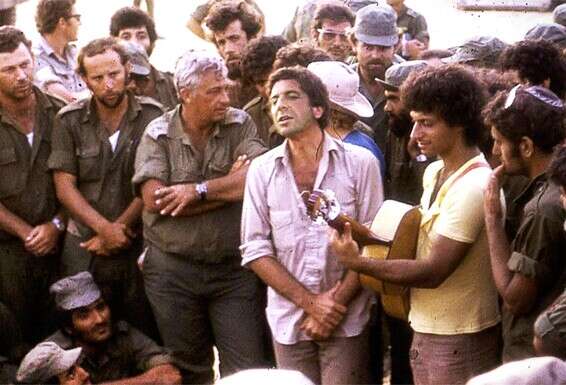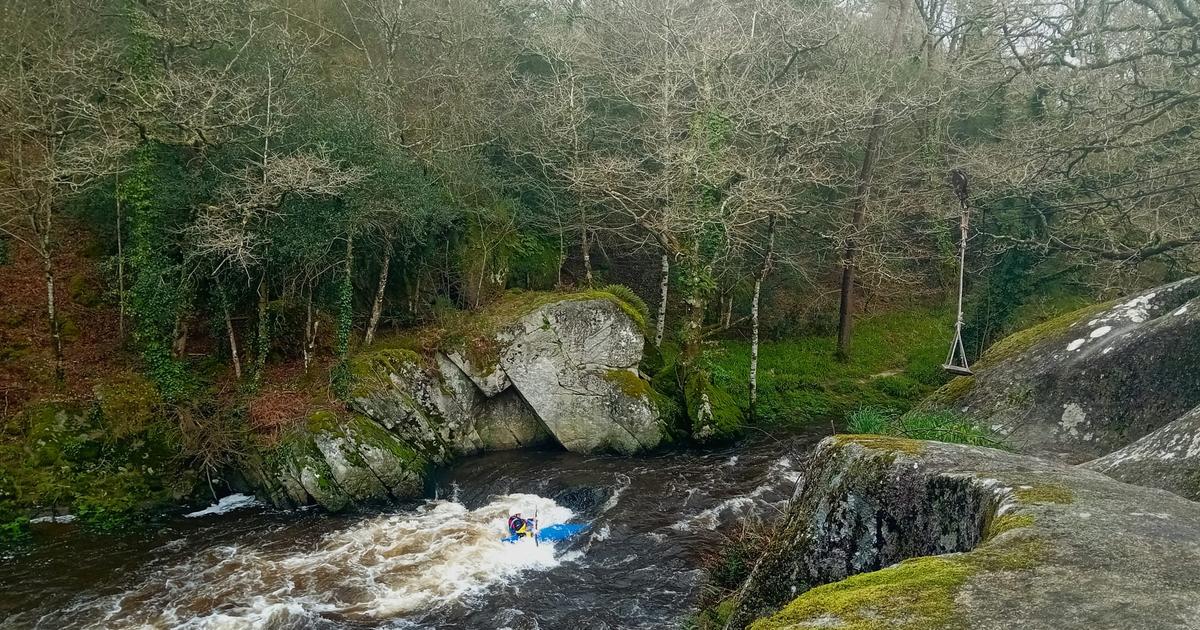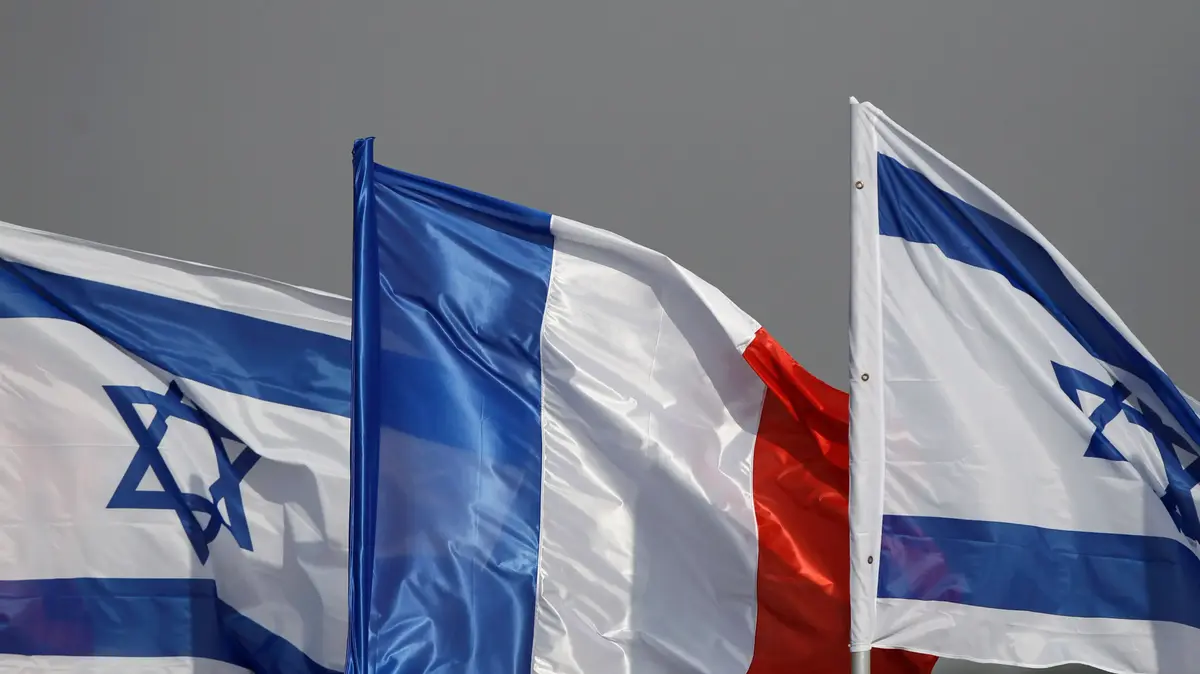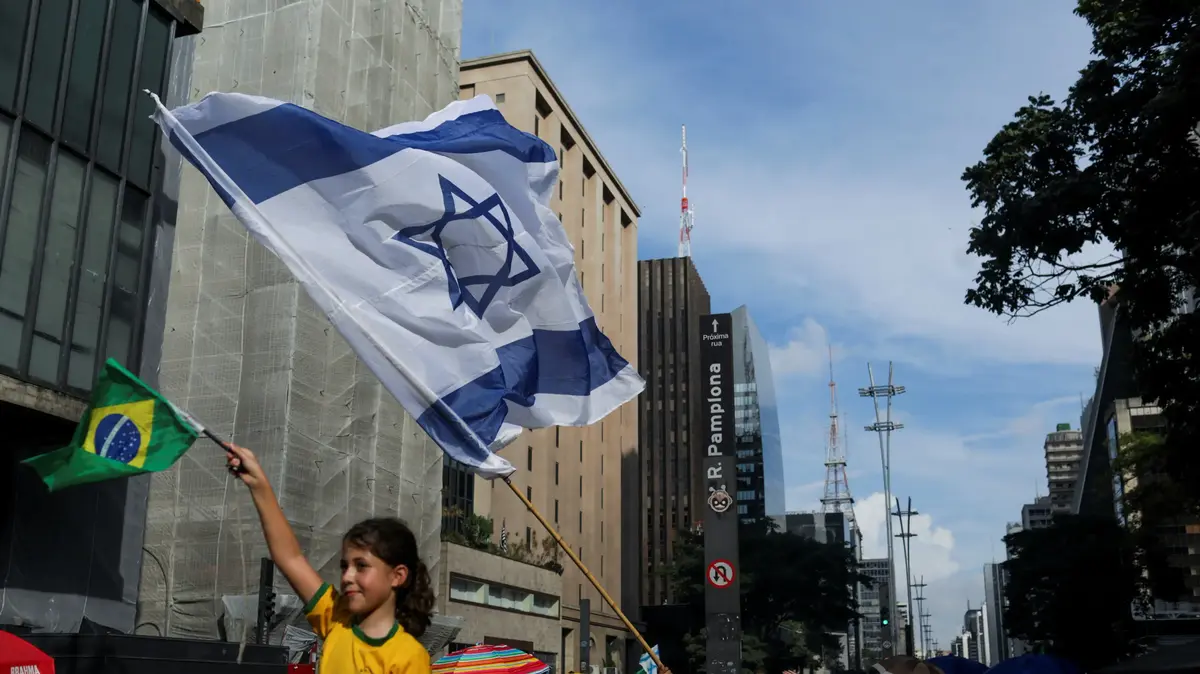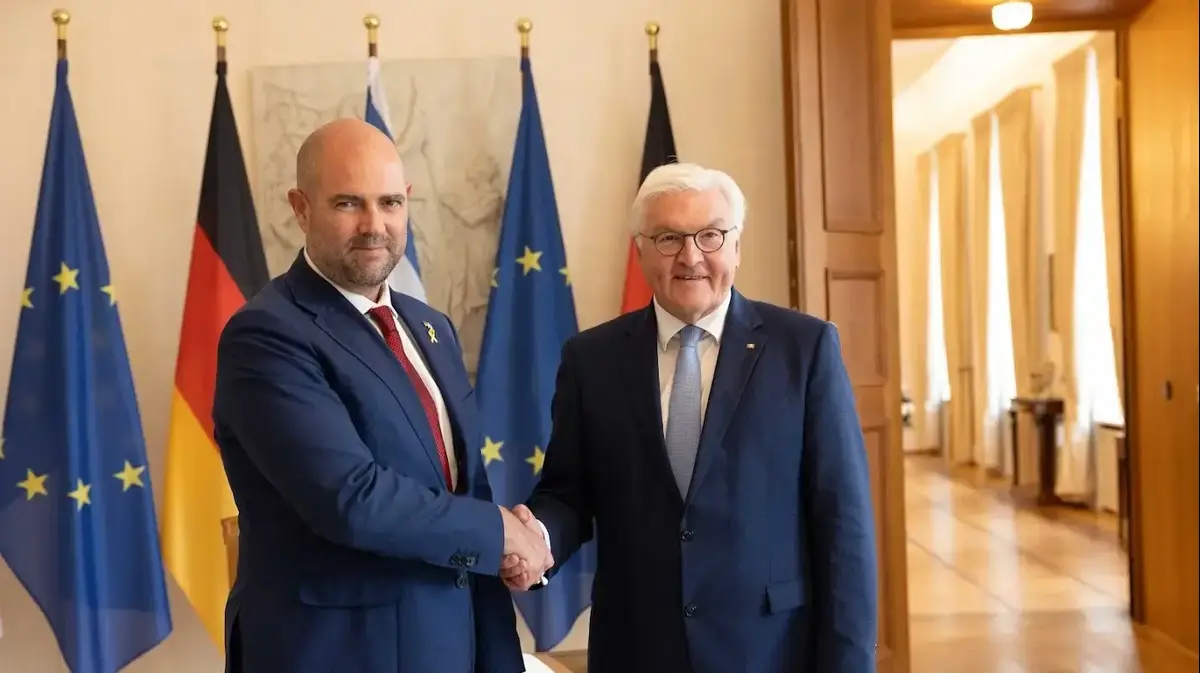Leonard Cohen's tour with IDF soldiers during the war spawned some of his greatest hits • On the way, connected to his Judaism • We returned to those who met him closely
Leonard Cohen with Arik Sharon performing in an enclave near the Suez Canal
Photography:
Birch deer
From the dawn of history, poets have been drawn or reluctantly dragged into battle zones.
This is where language skills are required to describe the indescribable.
Praise and glorify the Most High, weep and mourn the dead.
Homer wrote the Iliad on the battles of Troy, Alterman joined the mortar battalion of the 8th Brigade in the War of Independence and wrote "Parking Night", a miraculous description that takes off from the many crafts of setting up a military camp to philosophical questions about the nature of war and what justifies killing another person during it.
Leonard Cohen's journey in Israel during and after the Yom Kippur War left a scorched impression on his work, but in recent years lesser-known details in Cohen's biography have been revealed, illuminating the tour in a slightly different light.
As a young and promising poet, Cohen discovered another talent - to be in the right place and at the right time when wars break out.
"I was in Havana, in 1961, during the invasion of the Bay of Pigs, fighting for both sides, and I wrote the poem 'The only tourist in Havana turns his thoughts towards Canada,'" he once recounted.
The invasion of the Bay of Pigs was the culmination of a move in which the United States tried to carry out a coup in Cuba. .
Cohen said he was arrested by Cuban security forces, who considered him a CIA man.
Maybe it was the khaki clothes and the thick beard he grew that raised the suspicion.
He describes the incident with humor, but does not explain why he came to Cuba.
From Canada Leonard moved to the island of Hydra in Greece and settled there, where he met his muse - the Norwegian Marianne Ihlen.
From the island he would wander around Europe to read his poems.
Cohen was also present during the coup and the rise of the military junta to power in Greece in 1967.
But the journey that left its mark on Cohen most of all was the tour in 1973 for an IDF soldier. I wanted to see how that journey was recorded by all those who were partners in it - artists, organizers, and especially the spectators who attended the performances.
"Leonard did not come to Israel after the war broke out," says Oshik Levy. "He was already in the country, he had an affair with some beautiful flight attendant, and he kept coming here to be with her. On Saturday, when the war broke out, I showed up at the base and the next day I went to California Cafe. And we formed the team with Popik Arnon, Ilana Rubina and Matti Caspi.
"I saw Leonard Cohen sitting in the corner. I asked him what he was doing here, he said he wanted to help. I invited him to join the team we set up, he was afraid to come with us to performances. 'My songs are very quiet and very sad,' he said. I offered to come and see what happens. "That evening we performed together and when Caspi accompanied him. Cohen was shocked, because Mati was a genius and did arrangements for him while playing and Leonard was shocked by the arrangements."
In the late 1960s, Cohen became known mainly for the performances of other singers for his songs.
Many years into his career he will scoff at his song "Song Tower" for his unique voice: "I was born with the gift of the golden voice."
Cohen never considered himself to have a particularly good voice, and in the beginning it was singers with an impressive voice like Judy Collins who released his songs.
Still, Cohen has had his albums released on one of America's most respected and significant record companies - Colombia.
Among all the flower children in the summer of love, Cohen stood out, who from the beginning presented a different, dark and mysterious musical vision.
Critics of the period did not like the morbidity and depression that we lied in the dark light of his songs, and one of them even stated that his albums should come with a tight set of cutting knives for veins.
"Only someone of his size knew how to give words and sounds for a moment." Cohen with Matti Caspi, alongside Ariel Sharon // Photo: Kobi Doron
Until 1973 his albums were sold in small numbers, probably in relation to his record company colleagues - Simon and Garfunkel, Barbara Streisand, Bob Dylan, and later also Bruce Springsteen, AC DC and now Adele.
His best known song at the time was "Susan", which was considered a slow dance song and nothing more.
A little different, hovering, flying
Over the years, Cohen's tour has been described as having taken place only in the Sinai desert.
The attempt to find out the exact details led me to Yehuda Peretz, who organized a significant part of that tour.
Peretz was at the time in charge of entertainment at Air Force bases in the north, "from the control unit in Meron to deep into the Syrian enclave, 40 kilometers from Damascus."
Wait, did Cohen appear inside Syria?
"Certainly, where our soldiers were - there were artists who performed for them. I did not see such mobilization and willingness of artists to do everything, as there was at that time. I worked then with many artists who volunteered and did their best. I remember the soldiers on Mount Hermon did not get performances because there was snow. Two meters, so I saw that there was a snow cat delivering supplies to the outposts, and I said I was going up with the artists. They told me 'Are you crazy? It's five hours from point to point'. We went up with Shaike Ofir and the suburbs. The suburbs sang everything they had, passed an hour and a half And entertained the soldiers at some outpost for three hours in a row without stopping.
"I also worked with the team of Oshik, Popik Matti and Ilana Rubina, who was joined by Leonard. At that time all the artists wanted to serve with the entertainment of the Air Force, because with us everything was arranged. With the Greens there was a meeting place in Rosh Pina, trucks, artists, all officers come "Education and it was like a market, 'What are you taking the tracker from me, take these, bring it to me', and come to the trucks. With us everything was tidy, there were no gigs, all the units knew I was getting to them in advance."
What does their show look like?
"The four musketeers Oshik, Popik, Ilana Rubina and Matti Caspi would come up and start singing a piece composed by Matti (Peretz remembers and sings the complex melody almost immediately) and then Ilana would sing 'King Solomon's', 'The Pepper Song', and Popik would do half a sketch and half a show Such a magician, and sang "Ballad Between the Stars" followed by the rising star - Oshik Levy, and sang beautifully. Then Oshik would say "A great Jewish singer from America came to us, the great singer - Leonard Cohen will come and go". "A few songs with the guitar alone or with Matti, and then it goes down, and the Musketeers would sing a few more songs together and finish."
How did the audience react to his songs?
"Look, Leonard was not known, it's not like today that there is YouTube, so they did not know each other, but people were so happy that someone even performed for them. I was once overthrown to take Zubin Mehta and the Philharmonic Orchestra to perform in Sharm el-Sheikh." I told them , 'Are you crazy? Philharmonic for soldiers?'
But it was important for the orchestra and Makhar promised to perform, so we flew to Sharm, and I was miserable all the way.
"We unloaded the instruments and the orchestra got on some makeshift stage in the middle of the sands, and I see they brought in everyone at the base, commanders, guards, drivers, cooks. I was sure there would be such a rebellion. What are you bringing us this nonsense? But they played familiar things. Like Carmen, and Zubin Mehta did it so beautifully and with good will that in the end everyone applauded them wholeheartedly. "
And were there other experiences with Leonard?
"He was a little different, hovering, flying, but on one of the trips he suddenly asked if I could let him shoot Uzi a little! I just missed that. I was a member of Kibbutz Hatzor at the time, and after the show at the base near I wanted him to see the children's house. I took him and we snuck Leonard was amazed that children live without their parents, and somehow Naama woke up, and he hugged and kissed her, and she giggled, and then the guard started yelling, I said to her, 'Hello, what do you have? This is a great singer from America!'
And she kicked us out - 'I don't care, the kids need to sleep!'
Today they would probably wake everyone up in his honor. "
What else interested him?
"He was very curious, asking about everything he saw. Sleeping in Ayelet Hashahar, I got up early and went outside and suddenly I see Leonard standing outside and watching intently. He asked me if there are synagogues here. I told him cute, it's a kibbutz, there is no here, but Her name is Hatzor HaGlilit, and there are more synagogues than houses. He asked me to take him there, wants to see and feel it. We went to Hatzor HaGlilit, I told them, 'Listen, this is a great singer from America,' they said okay and we got kippahs and arrangements.
"We sat in the back and I started to explain to him what they were reading, I saw that the person was completely excited and returned to his parents' house. He said that one of the strongest memories left of his father (who died when Cohen was 10, DP), were those times in the synagogue.
'I once did not understand these wonderful words and now I feel I belong to an ancient and mighty people, an important people,' he said.
When we reached Mount Meron he said to me, 'Judah, do me a favor, take me to Safed,' and again asked to go to a synagogue.
It was simply his journey of reconnection with Judaism.
"Throughout the period I had a guitar with me. I felt the songs emerge from me again." Leonard Cohen // Photo: GettyImages
"When we passed Rosh Pina I took him to Shlomo Ben - Yosef's grave that the British hung and he was shocked, his eyes were stuck in her condition. I do not understand how after all this shock he did not stay in the country. You know, he would hardly speak, here he absorbed and absorbed and absorbed "Listen and listen. He would express himself in songs, I think he was here to experience the thing itself, the war, and it amazed him so much."
There is the famous picture where he stands and sings with Matti Caspi, and Arik Sharon behind him. Do you remember that?
"Yes, it was in a performance in the enclave across the canal, Eric banged his head in the mirror of his car, put on a bandage and it was photographed great. I love the man, he was a charming man with a rare sense of humor, but also a great hunter. A hopeless politician, a target. And strived for it, and yet it was Eric's daring that saved the war. It was a difficult but beautiful time, we did something. They attacked us, and we won. The press was on its agenda: 'loss', 'failure', it did not "A connection to reality. It was the greatest victory of the people of Israel. A much more heroic war than the six days. And we, the 'artists and parasites' in education, also did our part."
Susan's man has arrived
"In 1973, I was 19," says H., who served at the Ramat David Air Force Base. "I was a operations clerk at the base. Like everyone else, I was from the surrounding kibbutzim. Most of the pilots were kibbutzniks, and the whole base felt like such a strange kibbutz instead of Gad." That there are planes in it.
Before the war there was also a stellar atmosphere, we smoked, even grew all kinds of weeds at the base.
"That's how we got to know Leonard Cohen. 'Suzanne' was a classic love song, it was almost a code. If someone offered to come and hear 'Suzanne', you knew exactly what he meant. If you wanted to say come on, and if I did not want to, I would say I Prefers to hear Gevatron. With all that it was pilots, we also had to take care of ourselves because there were always things that do not pass today, or pass as sexual harassment, but then - 'What do you say, want to hear' Susan '?'
"But it was all in the world before me. In the war we were terribly upset. On Saturday we wrote down all the attack plans and did not understand that we were sending the pilots to die like flies in front of anti-aircraft guns we did not know, with inappropriate armament.
There was a feeling of chaos, great fatigue and mostly despair.
One day a missile fell from a plane that came back from an emergence, hit the shower and killed three soldiers, and the sad joke was that Auschwitz was here, dead in the shower.
Then in all this despair they said that Cohen was coming to perform for us.
Somehow they dropped me off to host him.
"We were given a large hangar of helicopters to appear in. The hangar also served as a sleeping place for soldiers who immigrated from Sinai to fight in the Golan, or vice versa, who remembers ... we asked for a place to be in the middle, and so between the sleeping bags and helicopters he had some space. Strange like that, closed a bit, I made him a cup of tea and it kind of released him.He in return gave me a big, nice hug like that, we started talking and he told me a bit who this is Susan, I did not tell him who she was for the base.
"I do not think anyone in Ramat David was impressed by the arrival of Leonard Cohen. I remember Simon and Garfunkel's performance in Israel, it was wow and exciting and huge. But Leonard's performance was not really like that. We knew such people in kibbutzim, all kinds of American or Canadian Jews or volunteers who sang beautifully. With a guitar in the club for a friend, nice but not exciting.That's how he was, what's more he was not Arik Einstein or some guy who knows what.It was mostly not the 'Leonard Cohen' he became later.
"And maybe it was not him, but me. I was constantly tired on the verge of losing self-control, at any moment I might fall apart. If I had slept three hours a night, it would have been happiness. Not sure I had a sensitivity or a place for his music. You see, at all A place I went to I would get phone numbers from people who asked me to call parents to tell them that their children were still alive. We were 19-year-old girls and boys, and we would doze off. No wonder I started smoking there then, the aunts from the Soldier's Committee handed us free cigarettes and we became addicted. Of numbness of the senses, vague smoke time.
"The audience was terribly sad, sat and listened but did nothing. Poor Leonard, it was not his fault. It was impossible to touch sadness, it was received with such indifference, and yet he went on and on. This war was a blow and we did not believe that was what was happening to us. That's it. "It was the end of the world as we knew it, as we wanted it to be, it was the end of the celebration. In retrospect, maybe his songs were the right thing for the right time, we were just the wrong audience."
"We went for him in the desert"
"There is a war between the rich and the poor, a
war between the woman and the man,
there is a war between those who say there is a war and those who deny it,
why not return to the war,
go ahead do not be a tourist,
why do not return to the war,
go ahead, the war is just beginning."
"I was exposed to serving before the army," says P. "I once rode a bus to my friend, and they played 'Susan' on the radio and some students started singing with him. Because I was so enthusiastic I got off two stations after my station. In '73 I was a young soldier in the Nahal , And after the paratroopers crossed the canal, they brought us to be saved and overcome.
"Everyone knew the best performances were in the Air Force, so there was a rumor that Leonard Cohen was coming. I remember we walked in the desert to get to the show. The fact that he crossed the canal impressed us very much, and even if not everyone knew the songs, he was a little depressed. And his personality connected him. Some people buy their world in one show. I saw Meir Ariel perform in Yeruham in front of ten people, and it was the same thing. He spoke to us, and about us. He had some sincerity that touched and felt his connection to Jewish history happening here. "In Ramat Gan in 2009, of all the songs, what do you remember at the end? The blessing of the priests that he made for an entire stadium."
"I asked Dad, I told him, change my name,
my current name, covered in fear, filth, remorse and shame,
and my love, my beloved love, come back to me ...".
A year after the war, Cohen released his fourth album, "A New Skin to the Old Ceremony," which shows the effect of the war on his songs.
The sound of the album was bare, rhythmic and much less gloomy than its predecessors.
Images of war and battles were present in Cohen's poetics, like his rendition of the partisans' song, on his third album.
But here the feeling was that the album portrayed the horrors of war with a bonfire guitar and Darbuka.
The song most identified with Cohen's tour of Sinai is "Lover, Lover, Lover."
In the original version the song opens with the line "I saw my brothers fighting in the desert".
Oshik Levy remembers that the song was written in an instant between two performances at the beginning of the war at Hatzor base.
Some viewers remembered Cohen as improvising his way with the song Along the Desert, as he used to do on his live albums from those years.
The song is unusual in Cohen's early work.
The rhythm of the dance, combined with Jewish harmony, raises the suspicion that Cohen wrote a Mediterranean song, including a place of applause, to deal with the horrors of war and to move and lift the tired face in front of him.
Ahlama Peretz was a soldier in the control unit at the Air Force base in Rafidim.
"The base was on a high jab and we worked constantly. We were shot by the Egyptian forces, so it was decided that all the men and women at the base would sleep in an underground bunker built underground," she says. "In the middle of the building was a large room like an empty concrete amphitheater. At midnight one of the clowns at the base opens the door and says that one night Leonard Cohen will appear in an underground bunker. And I do not believe but go see, and really one night Leonard with the guitar just goes to the microphone and starts singing. He seems completely committed.
"He was not a great talker. In between he said a sentence or two, and I remember he said something about Jerusalem, and someone shouted at him 'Jerusalem forever.' So Leonard smiled and said, 'Forever is a very long time.' He sang and sang for an hour and a half. "I remember that at 'Goodbye Marian' the soldiers stood and hugged and moved from side to side, singing with him. We just did not want him to go."
And you photographed him?
"Come on, who had a camera then?"
"He has entered a spiritual state"
"And who is on fire? And who is in the water?
Who is in the sun a day? And who is on a black night?
Who is in the four deaths of a court? Who is in the people's court?
Who in the month of May vibrates, who is in slow decline and
who is the one who calls me?"
During the war, N. arrived at Rambam Hospital in Haifa, where he relates: "My brother was wounded on the third day of the war, a shrapnel fell from his throat and his jaw crashed completely.
I came to be with him, he has not spoken yet but I remember some of the guys in the ward of the jaw wounded have already started even talking, so I guess in terms of times it was something like two weeks after the war.
Suddenly a rumor spread in the corridors of the ward, saying that Leonard Cohen deserved to appear.
And really, after a few moments I see him coming, walking alone without an entertainment team, he and the guitar.
"My brother was hospitalized in the last pavilion facing the sea. Outside there was a concrete plaza, and it was decided that the show would be there. It was completely surreal. Cohen, whom I knew only from the records in my room, was sitting a meter away from me. He was very excited, looking pale and tense. It was clear that he was experiencing difficult things and the sights around him were not easy.
"It should be remembered that in those days the depression was serious, in every part of Israeli society the feeling was that we lost the war. Many artists came to the hospital. There were those who came, sat in a room and sang to a person and a half who did not respond. Around Leonard there were many wounded, some people whose unit was not I survived. I felt he was in the market from being in the hospital, you know, it was a difficult experience. He did not talk much, there was no audience to talk to, there was a difficult atmosphere. Leonard sang a lot of songs, some I did not even know, and then he sang with a lot of emotion. A song I really liked, 'The Song of Isaac', the song about the binding, I had a feeling he was entering a spiritual state, something deep in him was moving.
"He finished the song and introduced the next song as a new song he had just written. I do not know, maybe it was the first or second time he sang it, and he started singing 'Who's on fire.' As he sang he shed tears, for all The wounded of the mouth and jaw, those who could not speak and knew the words from the Yom Kippur prayer, began to growl and touch with what they could and what was left for them. A kind of broken choir, everything felt like something out of a dream. All this sad atmosphere on the one hand, and some elation on the other. "Someone his size experiences and gives words and sounds to this moment. He finished, looked around and said he wished for peace. It was a rare moment, he was a great man. He had a presence, far beyond the singer."
To the next war
"Everywhere we went, Cohen wanted to be part of the unit, he wanted to be in the air force, in the navy, in the armor, he was really interested in everything we did," says Oshik Levy. "When we slept at night together he would lecture us on the Bible period and was very curious As for everything that happens here.
He asked a lot of questions, did not stop. "
When I tried to find out what Cohen did during the hours and days when he did not appear in front of IDF forces at the front, Yehuda Peretz said that throughout the period he would drop Cohen off at the entrance of a hotel on Hayarkon Street next to the US Embassy. Ira Real biography describes Cohen as spending his nights wandering around the volume. Casual loves and loneliness in the hotel After about a month and a half of performing with the staff and alone, Oshik Levy tried to arrange another tour for him, but Cohen refused and said "when diplomacy arrives - I will retire".
Cohen retired from the war, but instead of returning home to his pregnant wife, he made his way to Addis Ababa in Ethiopia, to witness the outbreak of civil war there.
Two years later he would explain: "For a while I was convinced that I would not release another album, I felt I was finished as a songwriter. The songs refused to come so I went to sunbathe in Ethiopia, but as I got there it rained. It was like that in the Sinai Desert. "I had a little guitar with me. There I felt the songs emerge from me again."
It is not clear what reason drew Cohen in those years to the danger zones again and again.
Was this an incredibly fortunate coincidence?
Secret missions?
Are the conditions hidden in his personality?
And maybe the reason was much more prosaic.
"When it comes to relationships, I find the best way to make them last years, is to just not define them ...," he said.
As a wandering troubadour and out of fear for the routine of family life, Cohen tried to escape far into the confines of dangers.
Years later he would ironically remark on the period that "women allow you to leave home for only two things: to make money, or to go to war."
Either way, what is clear is that for Cohen at the time, when the guns thundered, the muses sang louder.
"Lt. Cohen was our most important spy,
wounded during his service when he dropped drugs
into Fidel Castro's cocktails,
trying to persuade him to leave everything and return to nothing special
like waiting rooms, ticket queues, silver ball suicides
and other forms of boredom, famous as singing."

